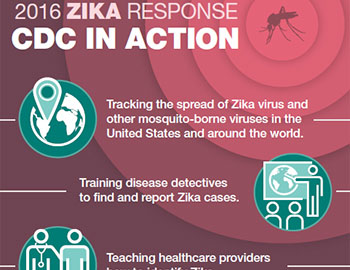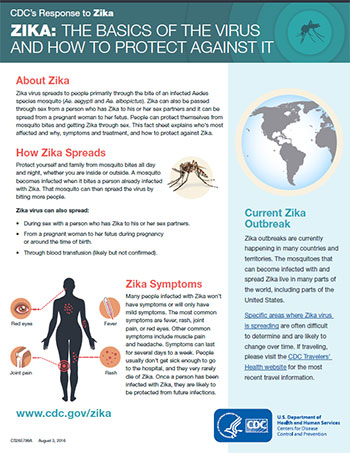
What CDC is Doing
CDC in action: What CDC is doing to help
 Tracking the spread of Zika virus and other mosquito-borne viruses in the United States and around the world.
Tracking the spread of Zika virus and other mosquito-borne viruses in the United States and around the world. Teaching healthcare providers how to identify Zika.
Teaching healthcare providers how to identify Zika. Read stories about CDC's response to Zika.
Read stories about CDC's response to Zika.Emergency response
CDC's Emergency Operations Center (EOC) is home to hundreds of CDC staff working in collaboration with local, national, and international response partners to analyze, validate, and efficiently exchange information about the Zika outbreak.
The EOC is the command center for monitoring and coordinating the emergency response to Zika, bringing together CDC scientists with expertise in arboviruses like Zika, reproductive health, birth defects, and developmental disabilities, and travel health. Their work includes:

- Developing laboratory tests to diagnose Zika.
- Conducting studies to learn more about the link between Zika and microcephaly and Guillain-Barré syndrome.
- Monitoring and reporting cases of Zika, which will help improve our understanding of how and where Zika is spreading.
- Providing guidance to travelers and Americans living in areas with current outbreaks.
- Surveillance for the virus in the United States, including US territories.
- Supporting on the ground in areas with Zika.
- Conducting a study to evaluate the persistence of Zika virus in semen and urine among male residents of the United States.
See more information on CDC’s activities for Zika.
Timeline
- Before 2015, Zika virus disease (Zika) outbreaks occurred in areas of Africa, Southeast Asia, and the Pacific Islands.
- In May 2015, the Pan American Health Organization (PAHO) issued an alert regarding the first confirmed Zika virus infections in Brazil.
- Currently, outbreaks are occurring in many countries and territories.
- On January 22, 2016, CDC activated its Emergency Operations Center (EOC) to respond to outbreaks of Zika occurring in the Americas and increased reports of birth defects and Guillain-Barré syndrome in areas affected by Zika. On February 8, 2016, CDC elevated its EOC activation to a Level 1, the highest level.
- On February 1, 2016, the World Health Organization declared a Public Health Emergency of International Concern (PHEIC) because of clusters of microcephaly and other neurological disorders in some areas affected by Zika.
- On February 8, 2016, President Obama announced a request for $1.8 billion in emergency funds for several agencies to accelerate research into a vaccine and educate populations at risk for disease.
- On April 13, 2016, CDC scientists announced that Zika virus is a cause of microcephaly and other severe fetal brain defects.
- On September 29, 2016, the President signed a continuing resolution that provides $1.1 billion in emergency funding for Zika response.
- On November 18, 2016, WHO declared the end of the PHEIC after deciding that Zika virus and its associated consequences remain a significant enduring public health challenge requiring intense action, but no longer represent a PHEIC.
Related Resources
What CDC is Doing

Zika: The Basics of the Virus and How to Protect Against It

 Training disease detectives
Training disease detectives 
 Studying links between Zika and
Studying links between Zika and 
 Advising
Advising 




















.jpg)












No hay comentarios:
Publicar un comentario